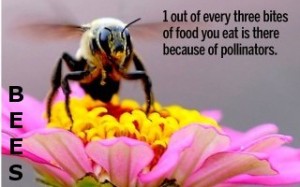The effects of GMOs and our environment requires a moratorium on GMOs as a “precautionary principle” to protect our biodiversity of our insect population.
What about the bees?
There have been reports of between 50% and 70% of bees being killed off this year, in a phenomenon whose causes are not yet fully understood. Bees pollinate almost 95 different kinds of fruit and their pollination services are valued between 20 and 30 billion USD annually in the U.S.
A bill has been introduced in the U.S. Congress to suspend the use of systemic neonicotinoids, a type of insecticide believed to be an important cause of bee die-outs in recent years.
The bill, called H.R. 2692: Saving America’s Pollinator’s Act of 2013, would also make the U.S. Environmental Protection Agency fully review the available scientific evidence before allowing other neonicotinoids to be sold. Read more…
Scientists Discover Key Molecule Linking Neonicotinoids to Honey Bee Viruses
A team of scientists in Italy believe they have found the molecular mechanism through which neonicotinoid pesticides adversely impacts the immune system of honey bees. The team’s experiments suggest that exposure to neonicotinoids results in increased levels of a particular protein in bees that inhibits a key molecule involved in the immune response, making the insects more susceptible to attack by harmful viruses. Read more…
Do you know GMOs and the associated pesticides and herbicides are effecting our aquatic life?
Relyea’s lab (2005) studies the severe lethal effects of Roundup on North American tadpoles. The study showed how 96-100% of larval amphibians died after being exposed to Roundup (Relyea, 2005). With that high of a percentage, it is likely that other aquatic organisms could be affected as well by the run-off of pesticides into the water where they live. This is a indirect effect of GMOs, but still can be traced back to the genetic modification of crops and the consequences they may have. Read more…
GMOs are destroying beneficial insects that help organic farmers avoid the chemicals used on conventional crops.
GMO Bt crops are lethal to beneficial insects, including ladybugs, butterflies and honeybees. SYN-05307-1 produces an insecticide designed to kill corn rootworm, and is likely to be especially toxic to other insects, especially ladybugs, that, like the rootworm, are also coleopterans. Read more…
The butterflies are no longer free…they are paying a heavy price.
Monarchs lay their eggs on milkweed, and their larvae eat it. While the evidence is still preliminary and disputed, experts like Chip Taylor say the growing use of genetically modified crops is threatening the orange-and-black butterfly by depriving it of habitat.
“This milkweed has disappeared from at least 100 million acres of these row crops,” said Dr. Taylor, an insect ecologist at the University of Kansas and director of the research and conservation program Monarch Watch. “Your milkweed is virtually gone.”
The amount of milkweed on farms in Iowa declined 90 percent from 1999 to 2009, according to Robert G. Hartzler, an agronomist at Iowa State. His study, published last year in the journal Crop Protection, found milkweed on only 8 percent of the corn and soybean fields surveyed in 2009, down from 51 percent in 1999. Read more…

